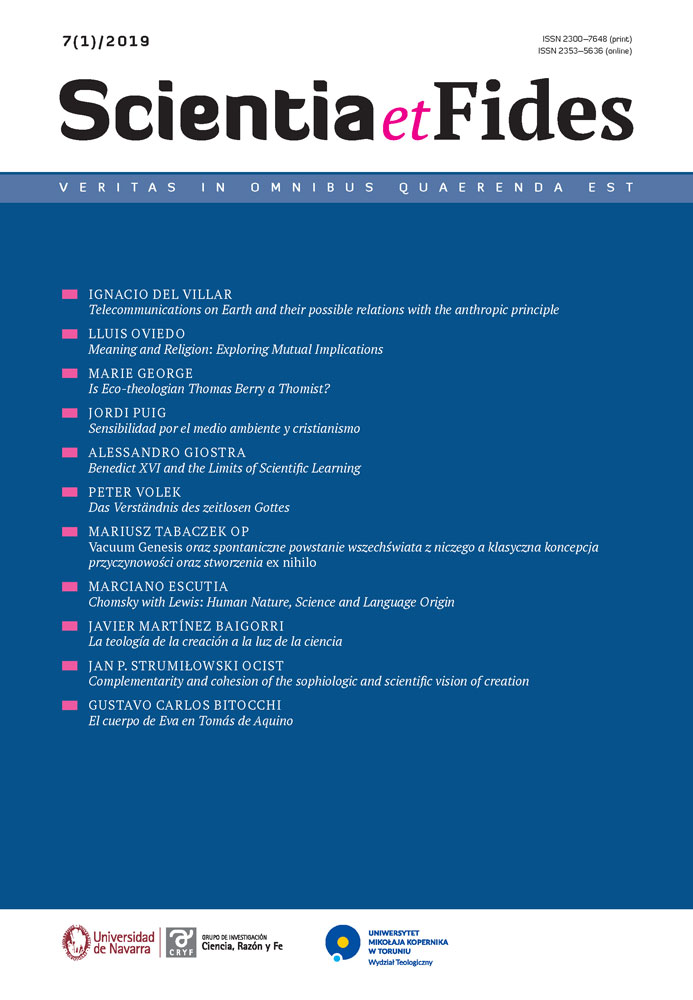Chomsky with Lewis: Human Nature, Science and Language Origin
Słowa kluczowe
Humanity, language origin, first hominids, original sinAbstrakt
This article, in its first part, summarizes Noam Chomsky’s ideas about human nature and their ethico-political consequences, language and its origin and the scope and limitations of experimental science. As a result, there will emerge the portrait of a great scientist without prejudices and a true and honest freethinker. Then, on the second part, and based on the author C. S. Lewis, a proposal will be made about the possible existence of an infused rational soul in humans and how it could connect with the linguist’s ideas with respect to the origin of language. It will also serve to supply with some realism Chomsky’s too optimistic view about human nature.Bibliografia
Berwick, Robert C. & Chomsky Noam. 2016. Why Only Us: Language and Evolution. The MIT Press Cambridge, Massachusetts.
Bolhuis Johan, Tattersall Ian, Chomsky Noam, Berwick Robert C. 2014: “How Could Language Have Evolved?”. PLoS Biol 12(8): e1001934. https://doi.org/10.1371/journal.pbio.1001934
Chomsky, Noam 1975. Reflections on language. New York: Pantheon.
Chomsky, Noam 1992. Chronicles of Dissent. Interviews with David Barsamian. Monroe, Common Courage Press.
Chomsky, Noam 2005. “Three factors in language design”. Linguistic Inquiry, Volume 36, Number 1, Winter 2005: 1–22.
Chomsky, Noam. 2010. The Chomsky Sessions. Interview with Michael Albert. Science, Religion and Human Nature. Accessed April 2019 at https://archive.org/details/ChomskyZMagazine
Chomsky, Noam. 2011a. “Language and Other Cognitive Systems: What is Special about Language?” University of Cologne lecture. Accessed April 2019 at https://youtu.be/6i_W6Afed2k
Chomsky, Noam 2011b. “The machine, the ghost, and the limits of understanding: Newton's contributions to the study of mind”. University of Oslo lecture. Accessed April 2019 at https://youtu.be/D5in5EdjhD0
Chomsky, Noam 2012a. The Science of Language: Interviews with James McGilvray. Cambridge. CUP.
Chomsky, Noam 2012b. “Grammar, mind and body: a personal view”. Lecture at the University of Maryland, College of Arts and Humanities. Accessed April 2019 at https://youtu.be/wMQS3klG3N0
Chomsky, Noam 2016a. “On the evolution of language: a biolinguistics perspective”. Interview accessed April, 2019 at: http://www.truth-out.org/opinion/item/37725-noam-chomsky-on-the-evolution-of-language-a-biolinguistic-perspective
Chomsky, Noam 2016b. “Language, Creativity, and the Limits of Understanding”. Lecture at UR Humanities Project. Accessed April, 2019 at https://youtu.be/XNSxj0TVeJs
Ding Nai, Melloni Lucia, Zhang Hang, Tian Xing, Poeppel David 2016. “Cortical tracking of Hierarchical linguistic structures in connected speech”. Nature Neuroscience 19, pp. 158–164.
Darwin, Charles 1859. On the Origen of Species. John Murray: London.
Dawkins, Richard 1995. River out of Eden. New York: Basic.
Dawkins, Richard 2015. Brief Candle in the Dark: My Life in Science. Ecco: Harper and Collins publishers: New York.
Escutia, Marciano 2017. “The will to love that makes a difference”. Sciencia et Fides. Vol. 5, 2: pp. 1–14.
Fitch, William T., Hauser, Marc and Chomsky, Noam. 2005. “The evolution of the language faculty: clarifications and implications”. Cognition 97(2): 179–210.
Hauser, Marc H., Chomsky Noam, Fitch, William T. 2002. “The Faculty of Language: What Is It, Who Has It, and How Did It Evolve?” Science 298, 1569.
Lewis, Clive S. 2014a (eBook version: originally published in 1943). The Abolition of Man. Samizdat University Press. Québec. Accessed April 2019 at http://www.samizdat.qc.ca/cosmos/philo/AbolitionofMan.pdf
Lewis, Clive S. 2014b (eBook version: first published in 1952). Mere Christianity. Samizdat University Press. Québec. Accessed April 2019 at http://www.samizdat.qc.ca/vc/pdfs/MereChristianity_CSL.pdf
Lewis, Clive S. 2016 (eBook version: originally published in 1940). The Problem of Pain. Samizdat University Press. Québec. Accessed April 2019 at http://www.samizdat.qc.ca/cosmos/philo/PDFs/ProblemofPain_CSL.pdf
Miller, Kenneth 2016. What makes us humans: a biologist and a philosopher discuss at MIT. Accessed on April 1st, 2019 at https://youtu.be/jYibo0cPs7A
Miller, Kenneth 2018. The Human Instinct: How We Evolved to Have Reason, Consciousness and Free Will. New York: Simon & Schuster. Kindle edition.
Miyagawa, Shigeru, Lesure, Cora & Nóbrega, Victor. 2018. “Cross-Modality Information Transfer: A Hypothesis about the Relationship among Prehistoric Cave Paintings, Symbolic Thinking, and the Emergence of Language”. Frontiers in Psychology 9.
Smith, Neil 1999, 2004. Chomsky’s ideas and Ideals. Cambridge, Cambridge University Press.
Ward, Keith 2008. The Big Questions in Science and Religion. Templeton Press. Kindle edition.
Pobrania
Opublikowane
Jak cytować
Numer
Dział
Licencja
CC BY ND 4.0. Posiadaczem prawa autorskiego (Licencjodawcą) jest Autor, który na mocy umowy licencyjnej udziela nieodpłatnie prawa do eksploatacji dzieła na polach wskazanych w umowie.
- Licencjodawca udziela Licencjobiorcy licencji niewyłącznej na korzystanie z Utworu/przedmiotu prawa pokrewnego w następujących polach eksploatacji: a) utrwalanie Utworu/przedmiotu prawa pokrewnego; b) reprodukowanie (zwielokrotnienie) Utworu/przedmiotu prawa pokrewnego drukiem i techniką cyfrową (e-book, audiobook); c) wprowadzania do obrotu egzemplarzy zwielokrotnionego Utworu/przedmiotu prawa pokrewnego; d) wprowadzenie Utworu/przedmiotu prawa pokrewnego do pamięci komputera; e) rozpowszechnianie utworu w wersji elektronicznej w formule open access na licencji Creative Commons (CC BY-ND 3.0) poprzez platformę cyfrową Wydawnictwa Naukowego UMK oraz repozytorium UMK.
- Korzystanie przez Licencjobiorcę z utrwalonego Utworu ww. polach nie jest ograniczone czasowo ilościowo i terytorialnie.
- Licencjodawca udziela Licencjobiorcy licencji do Utworu/przedmiotu prawa pokrewnego nieodpłatnie na czas nieokreślony
PEŁEN TEKST UMOWY LICENCYJNEJ >>
Statystyki
Liczba wyświetleń i pobrań: 1857
Liczba cytowań: 0



